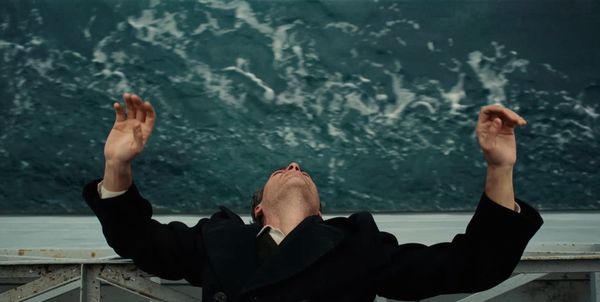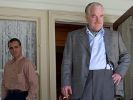Eye For Film >> Movies >> The Master (2012) Film Review
The Master
Reviewed by: Anton Bitel

The Master opens with an image of the roiling backwash in a ship's wake. A cut reveals naval seaman Freddie Quell (Joaquin Phoenix) peering over the edge of a boat in his helmet, and although it is unclear whether this is the same vessel, or another about to land for Pacific combat, the juxtaposition of these shots suggests that Freddie is himself looking back at the swirl and turbulence of water already left behind forever.
Another cut, and Freddie is engaging in R&R rites of masculinity with his fellow seamen on a beach: drinking, wrestling, telling lewd stories about the eradication of pubic crabs, and miming sex acts upon a woman fashioned entirely from sand, who will eventually be washed away by the rising tide. The absence from this fetish object of any human reality renders all the more poignant the tender manner with which Freddie then lies alongside 'her', desperately longing for feminine warmth and comfort long since gone.

The Second World War is coming to an end, and Freddie, who has a family history of mental illness and alcoholism, is undergoing a psychiatric evaluation following a reported 'crying spell' on duty. "It was brought on by a letter I received from a girl I knew once," he tells the military doctor, citing "nostalgia" as the cause. Indeed, Freddie seems always on the run from a past that he is never fully able to shake off.
The rest of The Master will take place five years later, in 1950, with Freddie still adrift, uprooted and moving aimlessly forward, fuelled only by alcohol, aggression and animalistic impulses - he even walks like an ape. Working as a department store's photographer - while secretly boozing and womanising in the developing room - Freddie gets into an inebriated tussle with a suited, moustachioed customer, and once again flees into an uncertain future.
Some time later, after fleeing yet another alcohol-related incident on a cabbage farm, Freddie ends up dead drunk and stowed away on a large private yacht. There he meets suited, moustachioed Lancaster Dodd (Philip Seymour Hoffman), and under the charismatic older man's guidance embarks on a series of 'processes' designed to delve deep into his past and to discover - and overcome - the source of his bestial appetites and unchecked emotions. Yet as Freddie revisits (in his mind, and eventually in reality) his past relationship with young love-of-his-life Doris, Lancaster also heads into the past, not only struggling to remember where he has met Freddie before, but also elaborating a whole prelapsarian mythology, set 'trillions' of years earlier, for the benefit of his movement, known as 'the Cause'.
Freddie is drawn to Lancaster with the same intoxicating addiction as he is to the alcohol that killed his own father, and Lancaster, too, clings to Freddie against the advice of his real family. For all their apparent differences, both men are united by maritime pasts, a love of liquor and a propensity to explosive rage. Freddie, himself a confessed liar, sees through Lancaster's humbug relatively early, and yet remains loyal, eventually picking a point on the horizon and heading off in his own direction for different reasons. So although The Cause is clearly inspired by Dianetics and the controversial Church of Scientology, writer/director Paul Thomas Anderson shows only marginal interest in exposing, through the figure of Lancaster, L Ron Hubbard as either idealistic visionary or flagrant fraud. Rather, the focus here is on Lancaster as imperfect father to Freddie's unruly son, and the lessons that he imparts – processes involving the surrender of self to repetitive exercises – might just as well have come from a kung-fu sifu or Jedi master as from the leader of a cult.
In any case, while Lancaster may be the 'Master' of the title, one scene in which he is taken in hand by his wife Peggy (Amy Adams) suggests that he is master neither of his household nor indeed of his own lusts – while near the finish Freddie himself is shown playing the master in a sexualised parody of Lancaster's teachings. Yet Freddie too, far from straightforwardly becoming a master of his own destiny, ends up more or less where he started: drinking, clowning, fucking – and again recalling himself lying beside an elusive woman of sand.
Perhaps, then, the title of Master is best reserved for Anderson himself, who builds, as if from water and sand, a story that is messy in the very best sense, crumbling before the viewer's eyes before it can be easily grasped or penetrated. For this is an ambiguous, shifting tale, demanding multiple viewings much as Lancaster's 'processes' require repetitive drilling to achieve their desired effect. Anderson brands this material with signature motifs from his other films – in particular, the improvised, extended family and limp-dicked conclusion of Boogie Nights (1997), and the headstrong clash of male personalities from There Will Be Blood (2007).
At the same time, Anderson draws direct parallels between the workings of Lancaster's cult, and the power of cinema itself, to help us work (and confabulate) through our traumas, memories and anxieties. It is hardly accidental that Freddie is shown distributing leaflets for the Cause while standing outside a cinema. Later, Freddie will dream of being contacted by the father whom he has abandoned, as he sleeps – of course – inside a movie theatre. Cinema, after all, is the place where past lives reside to become story – and we, its audience, process its images, using them to interrogate our own memories and experiences, as though willingly submitting ourselves to something like Scientological auditing.
In their different ways, Freddie and Lancaster are both on a quest for causes, sources (Quell's name resembles the German word for 'source', Quelle) and origins to help moor them in a time of great transition (America's post-war era, the formative years of our own age) – and as though to mirror this retrospective process, The Master itself is a period piece, resorting to the 65mm film stock that presented the grand cinematic visions of the Fifties and Sixties, but has long since fallen out of currency.
As Freddie and Lancaster go on a journey together that will take them backwards to move forwards, we watch them in a format that comes with its own in-built nostalgia, and are made to wonder along with them where we have come from and what we might have left behind. For, in prompting us to retrace a complex nexus of fluid, unresolved themes, and to reconstruct from all this narrative flotsam and jetsam something relevant to who we are today in another era of instability, The Master makes wake-watchers of us all.
Reviewed on: 12 Oct 2012
















